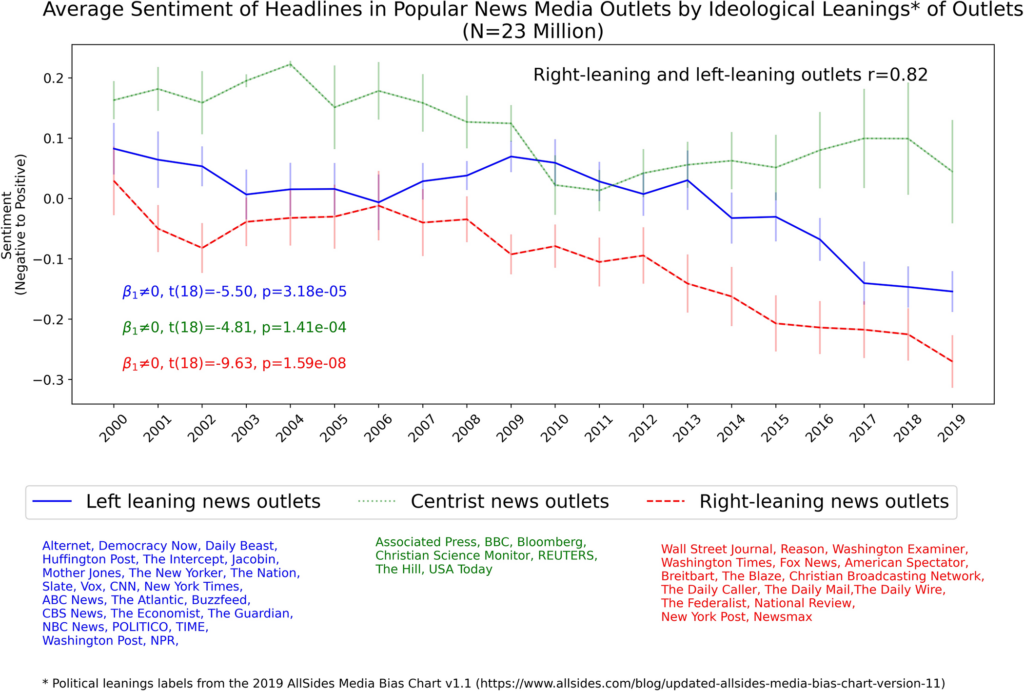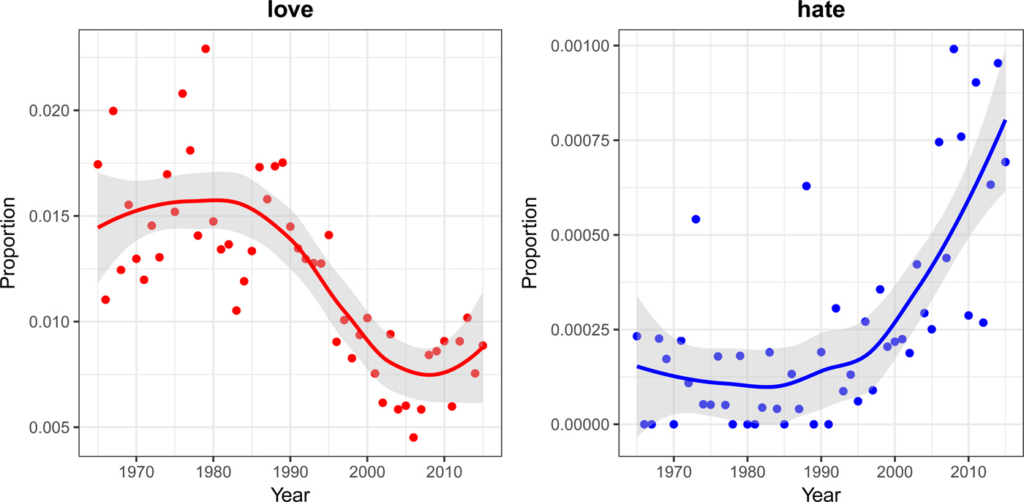Do you have the sense that everything is becoming more negative? Does what you hear on the radio, and what you read in the news, seem altogether gloomier than it did ten years ago? That’s because it is – say two new studies.
The first, by David Rozado and colleagues, tracks ‘sentiment’ in U.S. news headlines since the year 2000. (We’ve covered Rozado’s work before on the Daily Sceptic.)
His team quantified ‘sentiment’ – i.e., how positive or negative the headlines were – using machine learning tools. In simple terms, they used an algorithm to identify strings conveying positive emotions (e.g., ‘good’, ‘benefit’, ‘praises’) or negative emotions (e.g., ‘bad, ‘cost’, ‘attacks’), and then assigned an overall score to each headline.
Results are given in the chart below. There are three lines: one for left-leaning outlets, one for centrist outlets, and one for right-leaning outlets. (The researchers used Allsides ratings to classify outlets.)

There is a clear shift from toward negative sentiment for both left-leaning outlets and right-leaning outlets. For centrist outlets, by contrast, the shift is much less clear.
To home-in on exactly how headlines have been changing, Rozado and colleagues looked at six different categories of emotions: anger; fear; sadness; disgust; joy; and neutral. They found that the first four have all been getting more common, while the last two have been getting less common – at least since 2010.
As to why headlines have been getting more negative, the researchers suggest it may have to do with what goes ‘viral’. Studies have found that statements with strong emotional valence – particularly those that convey animus towards an outgroup – spread fastest on social media. Outlets are presumably tweaking headlines with this in mind.
The second study, by Charlotte Brand and colleagues, tracked ‘sentiment’ in pop-song lyrics since the 1970s. One of their key findings is shown in the image below.

It indicates that “love” has decreased as a proportion of all song lyrics, while “hate” has correspondingly increased. These are just examples: the researchers found a “substantial decrease” in the use of many positive emotion-related words (and a corresponding increase in the use of negative words).
Interestingly, when they ran models predicting whether a particular song lyric was negative, they found that chart position mattered: negative lyrics were more common in songs that reached positions in the chart (i.e., closer to ‘Number 1’).
It’s unclear exactly why this would be the case. One possible explanation is the rise of rap and hip hop in the 1990s, which gave rise to more songs about themes like gang violence and breaking up. Though this is speculative.
What the two studies do suggest is that your average American is now exposed to more negative emotional content in his daily life – assuming he reads the news and listens to an occasional pop song. Faced with this finding, it’s worth reminding yourself: things could always be worse.













To join in with the discussion please make a donation to The Daily Sceptic.
Profanity and abuse will be removed and may lead to a permanent ban.
It’s only because they are now cornered due to the many parents now attempting to sue the Tavistock clinic. The woke ideologues eventually crack under real pressure. Let’s keep up the opposing truth about gender which is, it is man or woman from birth to death.
We shouldn’t accept the term gender when sex is all we need.
…some of us more than others…
Yes
Friend of mine always used to put “yes please” on any form with a box labelled Sex.
Purile but a jolly jape none the less.
I still struggle to wrap my head around just how quickly the left, and their lily-livered enablers, have been able to invert the fundamentals of nature itself. We’ve regressed from a healthy acceptance of these minority groups to promotion of these groups. Bl**dy Pride parades and separate channels on tv and radio, designed to spread the idea that it’s somehow cool not to conform to your assignment at birth. Who get harmed? Children. Again. It’s not cool, not in any way, it’s dangerous brainwashing designed to make a tiny group of people feel better about themselves. It’s about narcissism, nothing more.
I have dangly bits. I am a man. If you don’t, you’re a woman. Yes, it is that simple.
Actually not: If you’re a man, each and every cell of your body as a male chromosome set, otherwise, a female one.
There’s a lot to be said for lay terminology, RW. Let’s keep it simple, stupid.
Not in this case, as the whole argument for a so-called medical transition is based on the Just some dangling bits! claim. But that’s simply not the case: Every cell of a male body is a male cell and likewise, every cell of a female body is a female cell.
A little pedantic – I was obviously talking about what we are born with, not what can now be transitioned to. It shows how far society has fell that even that simple statement causes confusion for some.
The confusion is entirely on your side. The capability of people to make a complete mash even out of the most simple statements is amazing.
Presence or absence of so-called primary and secondary sex organs does not mark people as male or female. A male eunuch is not a woman. The whole concept of a so-called medical transition is based the lie that this would be otherwise.
Male children are male before puberty and they will forever remain male (the same is obviously true for female children). At best, they can be castrated, mutilated and poisoned with hormons their own bodies cannot produce (simplification).
https://www.youtube.com/watch?v=pFHVV_GcykI
“Last night Professor Winston, one of the world’s leading experts on fertility and a Labour peer in the House of Lords, gave his view on the debate, saying we, ‘cannot escape our genetics’.
He said: ‘There is no question that we can change our gender, we can do it by mutilating ourselves, we can do it by removing bits of our body and therefore change our shape and so on.
‘But you can’t change your sex, because that is embedded actually in those (a person’s) genes in every cell in the body, that’s the difference.’”
https://www.dailymail.co.uk/news/article-11009151/Fertility-expert-Professor-Robert-Winston-says-escape-genetics-trans-debate.html
People don’t have a gender, nouns do (at least in languages where nouns are gendered, something they’re generally not in modern English). Gender of people is a fictional concept invented for the purpose of studying it (by collecting anecdotes) which is part of the well-established social science scam.
I am concerned that Professor Winston unwittingly may have given the false impression that there is some scientific validation of gender as he spoke about both sex and gender at the same time.?
I feel sure he was probably cautiously not wanting to upset the gender ideologues but scientists like him who know the truth should be more candid especially as we now know the horrors of the Tavistock clinic . He could save many young people from mental health dysmorphia torment.
No confusion my side whatsoever. The confusion is marked with your assertion that the definition needs to be so clearly defined. Without realising it you’ve unwittingly fell victim to the very ideology you find so distasteful. Your utterances are of someone so knee-deep in the muck that they find themselves digging downwards. Nobody but people who have fell victim to this garbage in some way, need an explanation of what it is to be male or female. I certainly don’t, but it seems like you better keep reminding yourself.
No confusion on your side whatsoever, you’re just insisting on misinterpreting my simple statements in a completely absurd way diametrically opposed to its meaning …
I can actually hand that back to you: You’ve fallen into the Medical sex change is possible! trap whose central mantra you are stubbornly repeating. But be it so. I don’t feel like repeating myself for a fourth time and don’t think that would be helpful.
You are certainly repetitive, that’s something we definitely agree on. Thanks for the patronising lessons btw, very informative… for a 5 year old maybe.
England is really an island of common sense here. The currently ruling German coalition (SPD/ Greens/ FDP) has a green Familienministern (female secretary of state for families(!)), which (until a recent public outcry made them moderate language a litte) marketed puberty blockers directly to prepubescent children on a dedicated web site as convenient and harmless method to give them more time to decide which kind body would be right for them before the (bad/ irreversible) puberty would set in. It also told children that they shouldn’t talk or listen to their parents about this as their opinions would just be Quatsch (informal word for nonsense suggesting strongly that only really stupid people could ever have such an obviously wrong world view).
After this got publicized by the German national tabloid (Bild), a statement that the secretary of state for families doesn’t recommend taking puberty blockers and that a doctor should be consulted about this was added. It is, however, highly unlikely that this particular leopard changed its spots.
Unfortunately in Scotland men in beards with dresses rule the woeful SNP/Green coalition, and the grooming of young people is not abating. The Sandyford clinic who is equivalent of the Transtock continues to operate. These cultists are the “progressive” shield for Sturgeon as her binfire of a government continues to fail on ferries, drug deaths, education, energy policy and every other area they are accountable for. They are however very good at throwing handouts to teenagers and allowing woke brats and their adult groomers a disproportionate say in our future. That’s why many of us who supported independence no longer want it.
It is right to be sympathetic towards those with a gender dysphoria — but I suggest that in the main these should be offered psychotherapy rather than gender transition. Transition might be appropriate for a minority of cases, but many would be better advised to learn to be comfortable in their own bodies (even if it isn’t a complete satisfaction).
This is a hundredfold true for children — they go through a complex set of changes during puberty and their own gender identity can get challenged — but in the main these are temporary and become resolved in time.
Polemically worded, gender dysphoria is a mental disturbance kids forced to spend too much time with adult transvestites sometimes develop. Like everything that’s dear to the woke heart, this is actually really old stuff: Serious attempts to sell bodily asexuality and sexual fluidity have been ongoing since the 1970s (called androgynity at that time).
At last a bit of common sense from the NHS, however I can’t see the woke lobby allowing them to get away with it and expect there’ll be a legal challenge before too long.
Especially from all those running training courses to teach the holy writ of ‘gender fluidity’.
Used to be called Tom Boys in my day.
“Stop Press: U.S. President Joe Biden has said that it’s “immoral” and “wrong” to restrict gender reassignment surgery and puberty blockers for children.” Just confirms the complete arse that we all know he is.